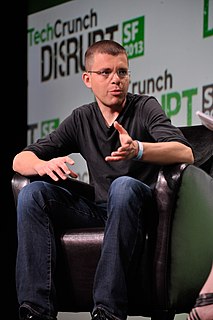A Quote by John Battelle
The largest issue with search is that we learned about it when the web was young, when the universe was 'complete' - the entire web was searchable! Now our digital lives are utterly fractured - in apps, in walled gardens like Facebook, across clunky interfaces like those in automobiles or Comcast cable boxes.
Related Quotes
Search is now more than a web destination and a few words plugged into a box. Search is a mode, a method of interaction with the physical and virtual worlds. What is Siri but search? What are apps like Yelp or Foursquare, but structured search machines? Search has become embedded into everything and has reached well beyond its web-based roots.
When you close a tab or when you finish an article on the web, it's gone unless you go back into your history or search for it or explicitly try to find it. Apps on your phone have this special property: they hang around. In some ways, they're more like a book on a bookshelf than they are like web pages.
When I'm introspective about the last few years I think the biggest mistake that we made, as a company, is betting too much on HTML5 as opposed to native... because it just wasn't there. And it's not that HTML5 is bad. I'm actually, on long-term, really excited about it. One of the things that's interesting is we actually have more people on a daily basis using mobile Web Facebook than we have using our iOS or Android apps combined. So mobile Web is a big thing for us.
Do you understand how there could be any writing in a spider's web?" "Oh, no," said Dr. Dorian. "I don't understand it. But for that matter I don't understand how a spider learned to spin a web in the first place. When the words appeared, everyone said they were a miracle. But nobody pointed out that the web itself is a miracle." "What's miraculous about a spider's web?" said Mrs. Arable. "I don't see why you say a web is a miracle-it's just a web." "Ever try to spin one?" asked Dr. Dorian.
What defines Web 2.0 is the fact that the material on it is generated by the users (consumers) rather than the producers of the system. Thus, those who operate on Web 2.0 can be called prosumers because they simultaneously produce what they consume such as the interaction on Facebook and the entries on Wikipedia.































